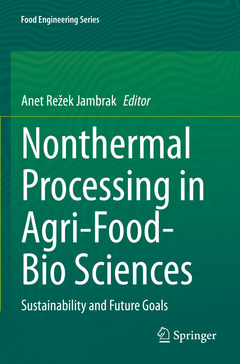Nonthermal Processing in Agri-Food-Bio Sciences, 1st ed. 2022 Sustainability and Future Goals Food Engineering Series
Coordonnateur : Režek Jambrak Anet

The industrial application of nonthermal processing has led to an increase in innovative value products and the overall improvement of production capacity. Nonthermal processes use less energy and chemicals, reduce processing times, have less environmental impact, produce less waste, and have the potential for industrial scale-up and a return-on-investment in under 5 years. According to The United Nations and the 2030 Agenda for Sustainable Development, 17 goals should be incorporated within development projects, and researchers are starting to use novel techniques to meet them. In covering the fundamental engineering theories underlying nonthermal processing, this book will aid in this mission.
The book overviews the advantages and disadvantages of novel technologies, over to sustainability goals to correct steps for the scale-up and return on investment. The book includes the chemistry and physics of nonthermal processing technologies, dedicated to specialists and researchers from a wide range of subject areas. Interdisciplinary scientists and engineers, sustainability experts can use this text to aid in their work in green technologies.
Part I: Introduction.- 1.Sustainability in food science and food industry: where are we now? – Viewpoints of the EFFoST Working Group on Sustainable Food Systems.- 2. Innovative processing: from raw material (culture), harvesting, post harvesting, processing, and applications.- Part II: Mechanism of action of nonthermal processing technologies (NTP).- 3. Fundamental mechanisms of action.- 4. Electro-technologies: pulsed electric fields, cold plasma, radio-frequency and oscillating magnetic fields, electrohydrodynamic processing, electron beam processing and ionizing radiation .- 5. Pressure-based technologies: high pressure processing; supercritical and subcritical fluid processing.- 6. Mechanical technologies: ultrasound, and hydrodynamic cavitation.- 7. Non-electro-technologies: gamma rays, UV light, pulsed light, ozonation, photodynamic and membrane processing.- 8. Non-electro-technologies: gamma rays, UV light, ozone, photodynamic and membrane processing.- Part 3: Implementation of novel nonthermal technologies in agri-food-bio sciences.- 9. Nonthermal Processing Technologies: Synergies and new applications in food engineering .- 10. Implementation of novel nonthermal plasma air cleaner in a plant factory.- 11. LED-based photosensitization – a prospect for visible light-driven nonthermal fresh produce sanitation.- 12. Electrospinning Technology: Its Process Conditions and Food Packaging Applications.- 13. Application of encapsulation technology in the agri-food sector.- Part 4. Nonthermal processing legislation.- 14. Overview of legislation across the globe, diagnostics and standards which provide a legal and regulatory framework in which NTP is used worldwide.- 15. Current technology readiness levels (TRL) of nonthermal technologies and research gaps for improved process control and integration into existing production lines.- 16. Industry implementation (scale-up): Clients’ experience towards understanding of how regulations are affecting novel product development.- 17. Supercritical fluids as a tool for sustainable manufacturing of added value products.- Part 5 Mechanisms of validation of nonthermal processes in biomaterials and agri-food applications.- 18. Current validation of NTP technologies and overview of their current and potential implementation in the production chain including agri-food wastes.- Part 6. Sustainable perspective of nonthermal technologies.- 19. New product development from marine sources and side streams valorization using nonthermal processing technologies.- 20. Efficient production of functional and bioactive compounds and foods for use in food, pharma, cosmetic and other industries.- 21. Decontamination of fruit juices by combination of high intensity pulsed light and other nonthermal technologies.- 22. Food-On-A-Chip: Relevance of Microfluidics in food processing.- Part 7. Food waste management and sustainable parameters analysis.- 21. Analysis and comparison of environmental impacts of nonthermal food technologies.- 22. Emerging non-thermal processing of food waste and by-products for sustainable food systems - selected cases.- 23. Strategies for commercializing scientific results and combining separate processes into complex technologies.- 24 Sustainable processing through efficient use of energy and minimizing waste production.- 25. Food Safety and Security (HACCP and HAZOP) for Consumers and Workers (Nonthermal Technologies and their use).- Part 8. Success stories of industrial implementation of nonthermal technologies.- 26.: Innovative success stories oncommercial non-thermal technologies - interviews of major food industries working in this area.
Date de parution : 09-2023
Ouvrage de 791 p.
15.5x23.5 cm
Disponible chez l'éditeur (délai d'approvisionnement : 15 jours).
Prix indicatif 158,24 €
Ajouter au panierDate de parution : 09-2022
Ouvrage de 791 p.
15.5x23.5 cm
